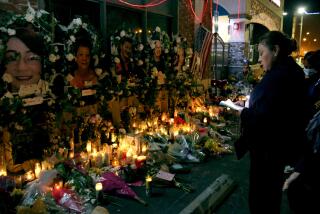IRS Reverses Denial : Massacre Aid Fund Wins Tax-Free Status
- Share via
More than a year after it was formed, a fund to aid survivors of the 1984 massacre of 21 people at a San Ysidro McDonald’s restaurant has been granted tax-exempt status, an Internal Revenue Service spokesman said Thursday.
IRS officials reversed an earlier denial of tax-exempt status after the San Ysidro Family Survivors Fund agreed to make some changes in the wording of its application. IRS guidelines require tax-exempt groups to benefit groups of people, not individuals, a spokesman said. The application, which originally described the $1.5-million fund’s beneficiaries as the shooting victims and their families, was amended to include “other persons adversely affected” by the shooting in order to comply with IRS regulations governing tax-exempt status.
“Whatever they (IRS officials) did is all right, as long as the objective is accomplished,” said San Diego Police Chief William Kolender, a former member of the fund’s board of directors who said he tried to convince IRS officials to reverse their initial decision.
Fund director James J. Lanas said the organization has dispersed about $450,000, mostly for immediate medical and burial costs, since the fund was started. But he said the organization was waiting for a decision on the fund’s tax-exempt status before distributing the rest of the money.
“Theoretically, they could have taxed us hundreds of thousands of dollars,” he said. The granting of tax-exempt status also means that contributors to the fund will be able to deduct their donations from their income tax retroactively.
Lanas said the group had always intended to aid anyone affected by the tragedy. As examples, he said the fund had already paid to fix a car hit by a bullet in the shooting, and had paid for baby-sitting costs for a San Ysidro woman who said she needed therapy after the the July 18, 1984, massacre in which James Huberty gunned down 21 people in a McDonald’s restaurant before he was shot to death by a police sharpshooter.
The survivors’ fund first applied for tax-exempt status in September. Lowell Langers, an IRS spokesman in Los Angeles, said the application was turned down about six weeks ago because the fund’s scope was too narrow. She said the reason was more than a technicality.
“It’s part of the law,” she said. “The class of beneficiaries must be broad enough so there is no question of aiding individuals. . . . We don’t have the discretion of saying, ‘That’s a nice thing, but it doesn’t fit, but let’s do it anyway.’ ”
After the application was rejected, the fund, which includes $1 million from McDonald’s and $100,000 from Joan Kroc among its contributions, started trying to exert pressure for a quick reversal.
“When we made public our dilemma, everyone’s reaction was, ‘We don’t believe it,’ ” Lanas said. “The tragedy affected not only San Ysidro, but all of San Diego and the whole nation.”
Lobbyists for the fund’s cause included Kolender, Sen. Pete Wilson (R-California) and U.S. Rep. Bill Lowery (R-San Diego), who sits on the congressional subcommittee that oversees IRS funding.
“There was a lot of heat put on,” said Dan Greenblat, a spokesman for Lowery. But he added, “The IRS is viewed as a very cold, monolithic organization. I think here they showed a lot of compassion.”
More to Read
Sign up for Essential California
The most important California stories and recommendations in your inbox every morning.
You may occasionally receive promotional content from the Los Angeles Times.












